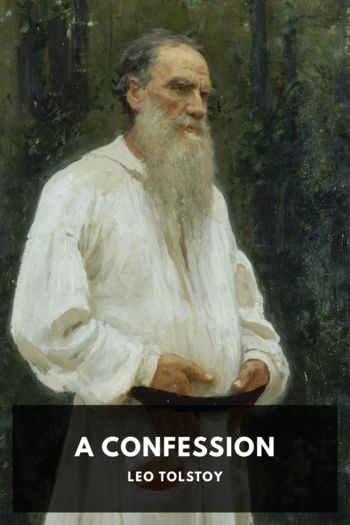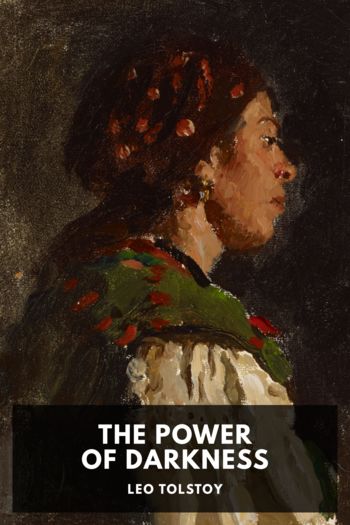Resurrection by Leo Tolstoy (best sci fi novels of all time TXT) 📕

- Author: Leo Tolstoy
Book online «Resurrection by Leo Tolstoy (best sci fi novels of all time TXT) 📕». Author Leo Tolstoy
“I did not know there was a ditch here,” he answered, smiling also, and keeping her hand in his. She drew nearer to him, and he himself, not knowing how it happened, stooped towards her. She did not move away, and he pressed her hand tight and kissed her on the lips.
“There! You’ve done it!” she said; and, freeing her hand with a swift movement, ran away from him. Then, breaking two branches of white lilac from which the blossoms were already falling, she began fanning her hot face with them; then, with her head turned back to him, she walked away, swaying her arms briskly in front of her, and joined the other players.
After this there grew up between Nekhlúdoff and Katúsha those peculiar relations which often exist between a pure young man and girl who are attracted to each other.
When Katúsha came into the room, or even when he saw her white apron from afar, everything brightened up in Nekhlúdoff’s eyes, as when the sun appears everything becomes more interesting, more joyful, more important. The whole of life seemed full of gladness. And she felt the same. But it was not only Katúsha’s presence that had this effect on Nekhlúdoff. The mere thought that Katúsha existed (and for her that Nekhlúdoff existed) had this effect.
When he received an unpleasant letter from his mother, or could not get on with his essay, or felt the unreasoning sadness that young people are often subject to, he had only to remember Katúsha and that he should see her, and it all vanished. Katúsha had much work to do in the house, but she managed to get a little leisure for reading, and Nekhlúdoff gave her Dostoevsky and Turgenev (whom he had just read himself) to read. She liked Turgenev’s Lull best. They had talks at moments snatched when meeting in the passage, on the veranda, or the yard, and sometimes in the room of his aunts’ old servant, Matróna Pávlovna, with whom he sometimes used to drink tea, and where Katúsha used to work.
These talks in Matróna Pávlovna’s presence were the pleasantest. When they were alone it was worse. Their eyes at once began to say something very different and far more important than what their mouths uttered. Their lips puckered, and they felt a kind of dread of something that made them part quickly. These relations continued between Nekhlúdoff and Katúsha during the whole time of his first visit to his aunts’. They noticed it, and became frightened, and even wrote to Princess Elena Ivánovna, Nekhlúdoff’s mother. His aunt, Mary Ivánovna, was afraid Dmítri would form an intimacy with Katúsha; but her fears were groundless, for Nekhlúdoff, himself hardly conscious of it, loved Katúsha, loved her as the pure love, and therein lay his safety—his and hers. He not only did not feel any desire to possess her, but the very thought of it filled him with horror. The fears of the more poetical Sophia Ivánovna, that Dmítri, with his thoroughgoing, resolute character, having fallen in love with a girl, might make up his mind to marry her, without considering either her birth or her station, had more ground.
Had Nekhlúdoff at that time been conscious of his love for Katúsha, and especially if he had been told that he could on no account join his life with that of a girl in her position, it might have easily happened that, with his usual straightforwardness, he would have come to the conclusion that there could be no possible reason for him not to marry any girl whatever, as long as he loved her. But his aunts did not mention their fears to him; and, when he left, he was still unconscious of his love for Katúsha. He was sure that what he felt for Katúsha was only one of the manifestations of the joy of life that filled his whole being, and that this sweet, merry little girl shared this joy with him. Yet, when he was going away, and Katúsha stood with his aunts in the porch, and looked after him, her dark, slightly-squinting eyes filled with tears, he felt, after all, that he was leaving something beautiful, precious, something which would never reoccur. And he grew very sad.
“Goodbye, Katúsha,” he said, looking across Sophia Ivánovna’s cap as he was getting into the trap. “Thank you for everything.”
“Goodbye, Dmítri Ivánovitch,” she said, with her pleasant, tender voice, keeping back the tears that filled her eyes—and ran away into the hall, where she could cry in peace.
XIIIAfter that Nekhlúdoff did not see Katúsha for more than three years. When he saw her again he had just been promoted to the rank of officer and was going to join his regiment. On the way he came to spend a few days with his aunts, being now a very different young man from the one who had spent the summer with them three years before. He then had been an honest, unselfish lad, ready to sacrifice himself for any good cause; now he was depraved and selfish, and thought only of his own enjoyment. Then God’s world seemed a mystery which he tried enthusiastically and joyfully to solve; now everything in life seemed clear and simple, defined by the conditions of the life he was leading. Then he had felt the importance of, and had need of intercourse with, nature, and with those who had lived and thought and felt before him—philosophers and poets. What he now considered necessary and important were human institutions and intercourse with his comrades. Then women seemed mysterious and charming—charming by the very mystery that enveloped them; now the purpose of women, all women except those of his own family and the wives of his friends, was a very definite one: women were the best means towards an already experienced enjoyment. Then money was not needed, and he did not require even one-third of what his mother allowed him; but now





Comments (0)